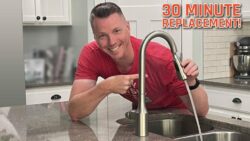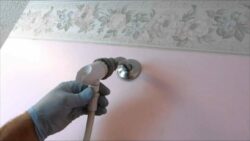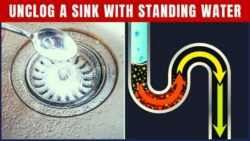How to Fix a Bathroom Sink That Won’t Drain
Is your bathroom sink draining slowly? Don’t let this common problem slow you down. With a little know-how and elbow grease, you can unclog your bathroom sink and have it draining smoothly again in no time.
In this article, we’ll guide you through the steps to fix your slow-draining bathroom sink. First, we’ll help you identify the cause of the clog. Often, clogs are caused by a buildup of hair, soap scum, and other debris in the drain. We’ll show you how to use household solutions like baking soda and vinegar to break up the clog and get your sink draining again.
If those solutions don’t work, we’ll guide you through some more heavy-duty solutions, like using a plunger or a drain snake. And once your sink is draining smoothly again, we’ll give you some tips on how to prevent future clogs. So power through that clog and get your bathroom sink flowing again!
Identify the Cause of the Clog
Let’s figure out what’s gumming up the works in your sink so you can get back to a smooth and steady flow. A common cause of a slow-draining bathroom sink is hair buildup. Over time, hair that falls into the sink can combine with soap residue and other debris, creating a clog. To remedy this, you can use a pair of pliers to remove the drain stopper and pull out any visible hair. If that doesn’t solve the problem, you can try using a drain snake or a mixture of baking soda and vinegar to cleanse naturally.
Another possible culprit is toothpaste. While toothpaste is great for your teeth, it can be tough on your sink’s drainage system. The thick, sticky texture of toothpaste can accumulate in your drain and form a blockage. If you suspect toothpaste is the cause of your slow drain, you can try using a plunger to unblock chemically.
Alternatively, you can use a mixture of baking soda and salt to break down the buildup and get your sink flowing freely again. Finally, hard water can also be a factor in slow-draining bathroom sinks. Over time, minerals in hard water can accumulate in pipes and create a blockage. If you live in an area with hard water, it’s a good idea to invest in a water softener to prevent mineral buildup.
If you suspect hard water is the problem, you can try using a commercial drain cleaner to unblock chemically. However, be careful when using these products as they can be harsh and cause damage to pipes over time.
Use Household Solutions
If you’re like most people, you probably have some natural remedies or DIY tricks lying around that could clear up your slow-draining bathroom sink. One popular option is pouring a mixture of baking soda and vinegar down the drain. First, remove any visible debris from the sink and pour a cup of baking soda down the drain. Follow this with a cup of vinegar and cover the drain with a plug or towel to keep the mixture contained. Let it sit for about 30 minutes before flushing the drain with hot water. This combination of baking soda and vinegar creates a chemical reaction that helps break down any clogs.
Another household solution you can try is using a plunger. Fill the sink with enough water to cover the head of the plunger, and then place the plunger over the drain. Push down and pull up repeatedly, creating suction to dislodge any blockages. If you don’t have a plunger, you can also try using a wire hanger to fish out any debris from the drain. Straighten out the hanger and bend one end into a hook shape. Insert the hook into the drain and gently pull out any hair or other debris.
If these household solutions don’t work, you can try using a combination of salt, baking soda, and boiling water. Mix 1/2 cup of salt and 1/2 cup of baking soda together and pour the mixture down the drain. Follow this with a pot of boiling water. The hot water helps dissolve any grease or soap buildup, while the salt and baking soda act as abrasive agents to help clear the clog.
Be careful when pouring boiling water down the drain, as it can cause damage to PVC pipes if not done correctly.
Try Heavy-Duty Solutions
You can take your sink-cleaning game to the next level by trying heavy-duty solutions that will leave your drain sparkling clean. While household solutions may work for minor clogs, heavy-duty solutions are necessary for stubborn blockages. Chemical vs. Manual: Which method is more effective?
Here are three heavy-duty solutions you can try to fix your slow-draining bathroom sink:
- Chemical Drain Cleaners: Chemical drain cleaners are an effective solution for tough clogs. These cleaners dissolve hair, soap scum, and other substances that cause blockages. However, they can be harmful to the environment and your plumbing system if used excessively. It’s important to follow the instructions on the label and use them sparingly.
- Drain Snake: A drain snake is a manual tool that’s used to break up clogs in your drain. It’s a long, flexible wire with a corkscrew-like end that’s inserted into the drain and twisted to remove debris. This method is effective and environmentally friendly, but it requires some effort and skill to use.
- Hydro Jetting: Hydro jetting is a high-pressure water jet that’s used to blast away clogs in your drain. This method is very effective and environmentally friendly. However, it requires professional equipment and knowledge to use.
It’s important to consider the environmental impact of heavy-duty solutions before using them. Chemical drain cleaners can be harmful to the environment and your plumbing system if used excessively, while manual tools and hydrojetting are more environmentally friendly. Choose the solution that works best for your situation and use it responsibly.
With these heavy-duty solutions, you can say goodbye to your slow-draining bathroom sink and hello to a clean, clear drain.
Prevent Future Clogs
To avoid facing the same problem again, it’s important to take preventative measures and maintain the cleanliness of your drain. One simple way to do this is to regularly clean out your drain using eco-friendly options. For instance, you can pour a mixture of baking soda and vinegar down your drain once a month to help break down any buildup and prevent future clogs.
Another preventative measure you can take is to use a drain stopper or strainer to catch any debris that may go down your sink. This will help prevent hair, soap scum, and other materials from building up in your drain and causing slow drainage or clogs. Simply remove the stopper or strainer after each use, clean it out, and replace it.
Lastly, be mindful of what you put down your sink. Avoid pouring grease, oil, or coffee grounds down your drain, as these materials can solidify and cause blockages. Instead, dispose of them in the trash or compost bin. By taking these preventative measures and maintaining the cleanliness of your drain, you can avoid the headache of dealing with a slow-draining bathroom sink in the future.
When to Call a Professional Plumber
Knowing when it’s time to call a pro plumber can save you from potential plumbing disasters. While you may be able to fix minor clogs with some DIY tips, there are certain situations where it’s best to leave it to the experts. One of the major factors to consider is cost. If you’ve tried all the DIY methods and the problem persists, it’s better to call a professional plumber than to spend money on ineffective solutions. Another factor to consider is the severity of the problem.
If you notice that the water in your sink is not draining at all, or if you hear strange noises coming from your pipes, it’s likely that you need professional help. These issues can indicate a larger problem with your plumbing system that requires the expertise of a plumber. Additionally, if you’re dealing with an older plumbing system, it’s best to leave any repairs or maintenance to the professionals. In some cases, attempting to fix a plumbing problem on your own can actually make the situation worse.
For example, using harsh chemicals to unclog your sink can damage your pipes and cause leaks. If you’re unsure about how to fix a problem or if you don’t have the right tools, it’s best to call a professional plumber. They have the knowledge, experience, and tools needed to diagnose and fix any plumbing problem quickly and efficiently.
FAQs
Can I use chemical drain cleaners to fix a slow-draining bathroom sink?
If you’re looking for a quick fix to your slow-draining bathroom sink, chemical drain cleaners may seem like an easy solution. However, it’s important to weigh the pros and cons before using them. Chemical drain cleaners can be harsh on your pipes, potentially causing damage in the long run.
Moreover, they can release toxic fumes that can harm both you and the environment. If you’re looking for alternative methods, natural solutions may prove to be safer and more sustainable. For instance, you can use a mixture of baking soda and vinegar to break down any buildup in your pipes. Another option is using a plunger or drain snake to physically remove any clogs.
By choosing natural solutions, you can avoid the potential risks of chemical drain cleaners while still effectively fixing your slow-draining bathroom sink.
How do I know if the clog is in the sink trap or further down the drain?
Signs that the clog is in the sink trap include slow-draining water, gurgling noises, and foul odors. If you’ve tried plunging and using a drain snake without success, it’s likely that the clog is further down the drain. Solutions for a clog further down the drain include using a hydro jet or calling a professional plumber to snake the drain.
It’s important to address clogs promptly to avoid further damage to your plumbing system.
How often should I clean my bathroom sink to prevent future clogs?
To prevent future clogs, it’s important to establish a regular cleaning routine for your bathroom sink. Cleaning frequency can vary depending on how often the sink is used and what types of products are used in it. As a general rule, it’s recommended to clean the sink at least once a week with a mild cleaning solution.
However, if you use a lot of hair products or have hard water, you may need to clean it more frequently. Preventive measures such as using a drain strainer and avoiding pouring grease or oil down the drain can also help keep your sink clog-free. By staying on top of cleaning and taking preventative steps, you can avoid the frustration and inconvenience of a slow-draining sink.
Will using a plunger damage my bathroom sink?
When it comes to unclogging your bathroom sink, you may think that using a plunger is the easiest solution. However, it’s important to consider the potential damage that a plunger could cause to your sink. Instead of reaching for the plunger, try using plunger alternatives such as a drain snake or a mixture of baking soda and vinegar. These methods can be just as effective without causing any harm to your sink. Preventing sink damage should be a top priority to avoid costly repairs, so be sure to choose the right tool for the job.
What should I do if none of the household solutions work to fix my slow-draining bathroom sink?
If you’ve tried every household solution to fix your slow-draining bathroom sink and none of them have worked, it’s time to consider professional help. Don’t panic, though – this doesn’t necessarily mean you’ll have to replace your entire sink.
A plumbing professional can use specialized tools and techniques to clear any stubborn clogs and get your sink functioning properly again. However, if your sink is old or damaged beyond repair, replacement may be the best option. While it may seem daunting, a new sink can actually be a great opportunity to upgrade your bathroom’s style and functionality. Don’t hesitate to call in the pros and explore your options.
Congratulations, you did it! You fixed your slow-draining bathroom sink like a pro. Now you can proudly say that you have the power to tackle any clog that comes your way. You’ve saved yourself time and money by avoiding a costly plumber visit, and you’ve gained valuable knowledge and skills for future household challenges.
But don’t stop there, why not take on even more DIY projects? You have the power to conquer any home improvement task that comes your way. With a little bit of research and determination, you can save yourself even more money and become a master of your own domain. So, go ahead and power through, the possibilities are endless!





